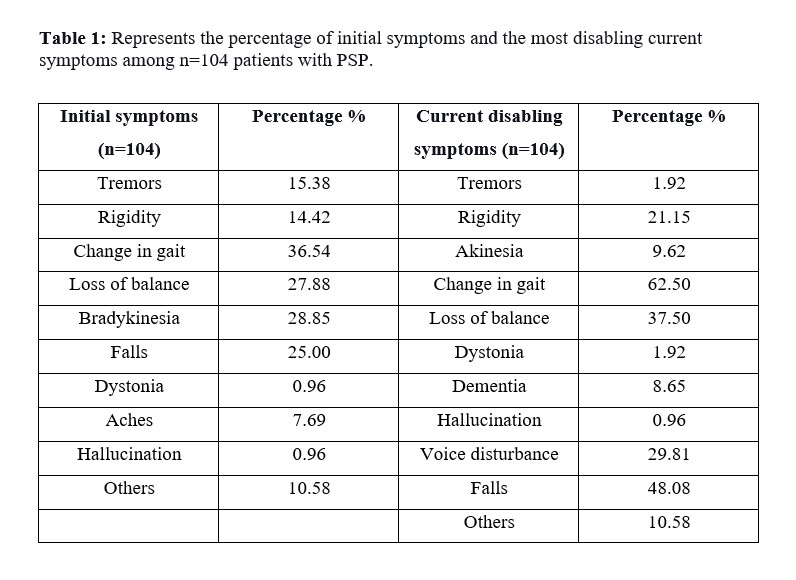Category: Parkinsonism, Atypical: PSP, CBD
Objective: We studied the clinical characteristics of patients with Progressive Supranuclear Palsy (PSP) with particular reference to sleep disorders and their associated features.
Background: PSP is the third most common neurodegenerative disorder. Among the non-motor symptoms, sleep disorders in PSP are a significant cause of poor quality of life. Insomnia, and REM sleep behaviour disorder have been reported in previous studies.
Method: : Prospectively, we recruited PSP (n=104) and control subjects (n=100) in a tertiary care centre at National Institute of Mental Health and Neurosciences (NIMHANS), Bengaluru, and India. The following variables were recorded: Clinical details, Unified Parkinson’s Disease Rating Scale (UPDRS) part 3 scale, PSP rating scale, Montreal Cognitive Assessment (MOCA), Hamilton anxiety scale (HAM-A), and Hamilton depression scale (HAM-D). The sleep abnormalities were quantified using the Pittsburgh Sleep Quality Index (PSQI), Epworth Sleepiness Scale (ESS), Mayo Sleep Questionnaire (MSQ), restless leg syndrome scale (RLS), Berlin Obstructive sleep apnea (OSA) score, REM sleep behaviour disorder (RBD), and medical history.
Results: The mean age was 62.05±7.19 years, with 67.4% (n=70) males and 32.6%(n=34) females with disease duration of 30.9±17.4 months reported in patients. The mean UPDRS score of 35.77±13.27, and PSPRS score of 38.51±14.94. Mean MOCA score was 16.38±17.48. Depression, were reported in 71/04, and anxiety in 58/104 patients. Symptoms are shown in Table 1. Sleep quality was quantified using PSQI scale and were reported in 45.2% (n=47) patients with mild (score 1-7), 44.2% (n=46) moderate (score 8-14), and 10.6% (n=11) had severe sleep difficulty (score 15-21). The ESS showed that 16% (n=17) had borderline sleepiness, and 14% (n=15) had abnormal sleep during the daytime. A mean score of 6.19±2.14 on MSQI scale. Moreover, 12.5% (n=13) of patients were associated with RLS. Patients with PSP reported RBD in 12.5 % (n=13) of patients with PSP. In PSP patients, 56% (n=58) have a lower risk, and 38% (n=40) with a higher risk can develop sleep apnea.
Conclusion: The patients of PSP had a poor sleep quality, abnormal sleep-in daytime, RBD and RLS with an increased risk of developing sleep apnea. A significant proportion of patients with PSP who have co-existing sleep disorders and need appropriate treatment.
Represents percentage of symptoms in PSP patients
To cite this abstract in AMA style:
M. Nanjunda Swamy, S. Dey, N. Kamble, V. Holla, R. Mahale, P. Pal, M. Debnath, R. Yadav. Spectrum of Sleep abnormalities in Patients with Progressive supranuclear palsy [abstract]. Mov Disord. 2024; 39 (suppl 1). https://www.mdsabstracts.org/abstract/spectrum-of-sleep-abnormalities-in-patients-with-progressive-supranuclear-palsy/. Accessed February 26, 2026.« Back to 2024 International Congress
MDS Abstracts - https://www.mdsabstracts.org/abstract/spectrum-of-sleep-abnormalities-in-patients-with-progressive-supranuclear-palsy/

